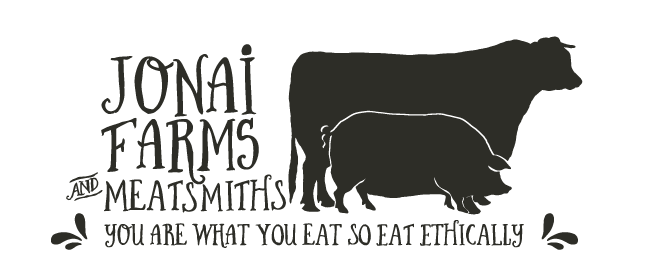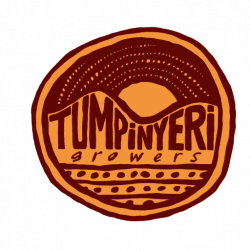Just over 11 years ago, a wide-eyed young family arrived on Dja Dja Wurrung Country - at 129 Morgantis Road Eganstown – ready to save the world while savouring it. Expressed with a bit less hubris, we just really wanted to enjoy a new life raising animals without fear or pain and able to express their natural behaviours on healthy pastures before taking their lives for human sustenance. Stuart was leaving a decade of middle management in automation with the extreme delight of a wage slave set free with land, sheds, and tools to work on a million projects, and I was armed with a bucketload of cultural theory around consumption and food systems, great admin skills, and no idea where the loin was on a pig or cattle carcass. Neither of us had a clue how to build a fence.
We knew how little we knew, but didn’t know what we didn’t know.
What started as a lifelong concern of mine for how animals are treated in industrial food production has become a complex and skin-tingling ability to see and feel webs of existence that eluded us in our city lives. Learning about grasses has taught us more about soils, and soils have taught us about fungi. Learning about microbial soil fauna has helped us think about the flora reliant on them, which has led us back above ground to native bees, beetles, and the birds that feast on them. Milking Clarabel and Wynny led us to the alchemy of transforming milk into cheese with the help of our tiny friends - lactic acid bacteria - where we encountered once again as if for the first time knowledge gained from a decade of annual traditions fermenting salami, and the summer harvests of garlic, chili, cabbage, and any other vegetable our curious hands can transform into jars of delicious condiments that litter our table and nourish our guts.
Today, we live, farm, feel, and listen on and to Dja Dja Wurrung Country (djandak), and acknowledge the care and custodianship of her First Peoples - Djaara. We pay our deepest respects and thanks for how life here was and continues to be sustained through dhelkunya dja – making good country / making country healthy - and commit our support in returning Country and all her denizens back to health.
We aim to contribute to Indigenous sovereignty and self-determination through land restitution, paying the rent, and decolonial approaches to agriculture.
Long-time followers of the Jonai journey will know that soon after our foray into farming, we built a boning room and commercial kitchen to realise the full benefit of the value chain here on the farm, and I became a vegetarian-turned-pig-farmer-turned-butcher. Many years on from that milestone, we move into 2023 with a focused gaze and a Gantt chart with a timeline for construction on a Jonai Meatsmith Collective abattoir, the development of an agroforestry system integrated into the design around the abattoir, and renewed commitment to the daily practices of farming and living in harmony with nature.
Long host to and members of a dynamic community on and around the farm, in 2023 we welcome the arrival of more careful custodians of Country as Tumpinyeri Growers move their market garden enterprise here in a landsharing arrangement designed to benefit djandak and all she supports.
Jonai Farms and Tumpinyeri Growers will share land, resources, labour, and community to run our respective enterprises raising pastured pigs and cattle and small-scale market gardening. We value relationships over transactions, and reflect on our relationships with djandak to help guide our relationships with each other, other farmers and suppliers, and the communities we feed.
The agreement includes landsharing for farming and also for living. The principles are based on exchanges of various kinds of value - social, ecological, economic, and cultural - where all parties aim to provide and receive value commensurate with need. We acknowledge the privilege we Jonai have in ‘owning’ title to unceded land, and seek through a landsharing agreement and in our daily practices to break down imbalances in power or fairness in our relations with each other and with djandak.
To say we’re excited about what 2023 holds for us and our community is an understatement. I have long described myself as an active optimist – active in my own optimism – and after enduring the biodiversity summit – COP15 – in Montreal last month I suffered a blow to that optimism in spite of my and many others’ activism there. I returned to the healing embrace of djandak and the nourishing interdependencies I have with her denizens, and I remembered I’m not only an active optimist, I’m a fiercely active optimist ever more committed to growing a world where everyone can experience food sovereignty, where Country and First Peoples are acknowledged and their rights to self-determination are respected and promoted.
As we move into this growing collaboration between djandak, Jonai and Tumpinyeri, we’ll share our efforts and our learning in the spirit of the nascent ‘agroecology lighthouse’ movement, ‘from which agroecological principles and lessons radiate out to the broader rural communities, helping them to build the basis of an agricultural strategy that promotes efficiency, diversity, synergy, and resiliency’ (Nicholls & Altieri 2018).
And remember, agroecology is a science, a set of practices, and crucially, it is also a social movement. Its success as a movement depends on the active collectivisation at farm, landscape, community, and national and global social solidarity movements. Wherever you see your opportunities to contribute to this critical transformation of our food and agriculture systems, we hope you act on them! Every person who joins a grassroots democratically constituted organisation like the Australian Food Sovereignty Alliance (AFSA) lends strength in both voice to government and funding for our domestic activities (and you can join for as little as $75 per year!).
Viva 2023! <3

